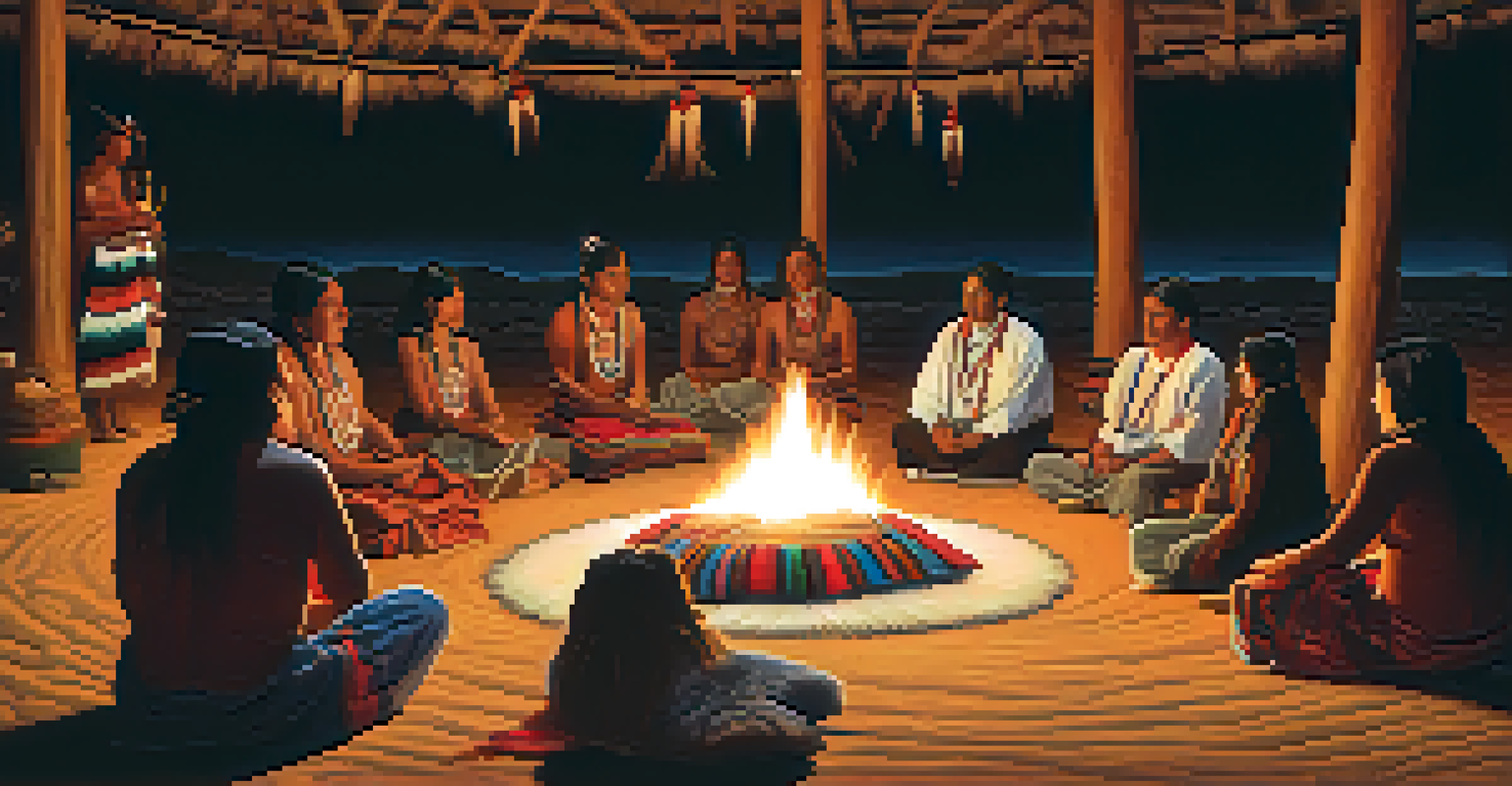Peyote Ceremonies: Ethical Considerations for Non-Indigenous

What is Peyote and Its Cultural Significance?
Peyote, a small cactus native to Mexico and the southwestern United States, is famous for its psychoactive properties, primarily due to the compound mescaline. For many Indigenous communities, peyote is not just a plant; it's a sacred tool used in spiritual ceremonies that connect individuals to their ancestors and the divine. These ceremonies have deep cultural roots and are often seen as vital for community healing and spiritual guidance.
Cultural appropriation is the act of taking or using elements of one culture by members of another culture, often without understanding or respecting the original context.
Understanding the cultural significance of peyote is crucial for anyone considering participation in these ceremonies. It's not merely about the experience; it embodies centuries of tradition and spirituality. The respect for this practice often stems from recognizing its role in the identity and resilience of Indigenous peoples.
When non-Indigenous individuals approach peyote ceremonies, it's essential to acknowledge this rich cultural backdrop. Respecting the traditions associated with peyote involves not just understanding its effects but recognizing its profound importance to those who have used it for generations.
The Importance of Cultural Sensitivity
Cultural sensitivity is key when engaging with practices like peyote ceremonies. It requires a genuine respect for the beliefs and traditions of Indigenous peoples, ensuring that participation does not exploit or commodify their spirituality. This sensitivity helps to foster an environment of mutual respect and understanding, which is vital for meaningful engagement.

Being culturally sensitive means recognizing the historical trauma faced by Indigenous communities, including the appropriation of their sacred practices. Non-Indigenous participants should reflect on their intentions and ensure they approach these ceremonies with humility rather than entitlement. It’s about honoring the traditions rather than simply seeking an experience.
Cultural Significance of Peyote
Peyote serves as a sacred tool in Indigenous ceremonies, embodying deep spiritual and cultural traditions.
Additionally, engaging in open dialogues with Indigenous leaders or practitioners can be incredibly beneficial. These conversations can provide insights into the proper protocols, expectations, and the significance of the ceremonies, fostering a respectful relationship between cultures.
Understanding the Risks of Appropriation
Cultural appropriation occurs when elements of one culture are taken by another, often without permission or understanding. In the context of peyote ceremonies, this can manifest as non-Indigenous individuals participating without honoring the origins and significance of the practice. This can lead to diminishing the sacredness of the ceremony and disrespecting those who hold it dear.
To engage with another culture, one must first understand and respect its significance, rather than simply seeking personal experience.
It's crucial to differentiate between appreciation and appropriation. Appreciation involves a respectful acknowledgment of another culture, while appropriation often involves taking without understanding or respecting the original context. Engaging in peyote ceremonies should be rooted in respect and appropriate acknowledgment of the Indigenous communities that have maintained these practices.
To navigate this complex landscape, non-Indigenous participants should actively seek education on the history and significance of peyote within Indigenous cultures. This understanding can help prevent appropriation and promote a respectful engagement with Indigenous practices.
Seeking Permission and Guidance
One of the most respectful ways to engage with peyote ceremonies is to seek permission from Indigenous leaders or practitioners. Many communities have specific protocols regarding who can participate in these sacred practices. Understanding these guidelines is not only respectful but also crucial for ensuring that the ceremony is conducted appropriately.
Additionally, some Indigenous leaders may offer guidance on how to engage with the ceremony in a way that honors their traditions. This might include participating in preparatory discussions or rituals that help frame the experience within its cultural context. Such guidance can enhance understanding and deepen the experience for non-Indigenous participants.
Importance of Cultural Sensitivity
Engaging respectfully with peyote ceremonies requires genuine respect for Indigenous beliefs and practices.
By prioritizing permission and guidance, non-Indigenous individuals can foster a more respectful relationship with Indigenous cultures. This approach not only honors the traditions of Indigenous peoples but also promotes a more authentic and enriching experience.
The Role of Education in Ethical Participation
Education plays a vital role in ensuring ethical participation in peyote ceremonies. Non-Indigenous individuals should take the time to learn about the history, significance, and current context of peyote use within Indigenous communities. This knowledge can help participants approach these ceremonies with respect and a genuine appreciation for their cultural roots.
Various resources, including books, documentaries, and workshops led by Indigenous scholars and practitioners, can provide invaluable insights. Engaging with these resources helps to dismantle stereotypes and misconceptions about Indigenous cultures and their practices. It's about going beyond surface-level understanding to grasp the deeper meanings behind the ceremonies.
Moreover, education can empower individuals to become allies rather than appropriators. By understanding the challenges faced by Indigenous communities, non-Indigenous participants can advocate for the rights and recognition of these cultures while engaging in their practices ethically.
Supporting Indigenous Communities
Supporting Indigenous communities is crucial for non-Indigenous individuals looking to participate in peyote ceremonies ethically. This support can manifest in various ways, from amplifying Indigenous voices to actively participating in initiatives that promote their rights and cultural preservation. It's about recognizing that engaging in these ceremonies is just one part of a larger picture of respect and solidarity.
Additionally, consider contributing to Indigenous-led organizations or initiatives that focus on preserving traditional practices and advocating for Indigenous rights. This demonstrates a commitment to understanding and valuing the culture beyond just the ceremonial experience. It's a way to give back and show appreciation for the knowledge and traditions shared.
Seek Permission and Guidance
Non-Indigenous participants should seek permission from Indigenous leaders to honor the protocols surrounding peyote ceremonies.
By fostering genuine relationships and supporting Indigenous communities, non-Indigenous participants can help create a more equitable space for cultural exchange. This ensures that the sacredness of peyote ceremonies is honored while contributing positively to the communities from which these traditions originate.
Navigating Personal Intentions and Reflections
Before participating in a peyote ceremony, it's essential for non-Indigenous individuals to reflect on their personal intentions. What draws you to the ceremony? Is it a genuine desire to connect spiritually, or is it more about seeking an altered state of consciousness? Understanding your motivations can help ensure that your participation is respectful and meaningful.
Taking time for introspection can reveal underlying motivations that might not be immediately apparent. It can also highlight the importance of approaching these ceremonies with an open heart and mind, ready to learn from the experience rather than simply seeking personal gain. This mindset fosters a deeper connection to the ceremony and its cultural significance.

Ultimately, navigating personal intentions is about cultivating respect for Indigenous cultures while enriching one's own spiritual journey. By being mindful of your motivations, you can contribute to a more respectful and enriching environment for all participants.